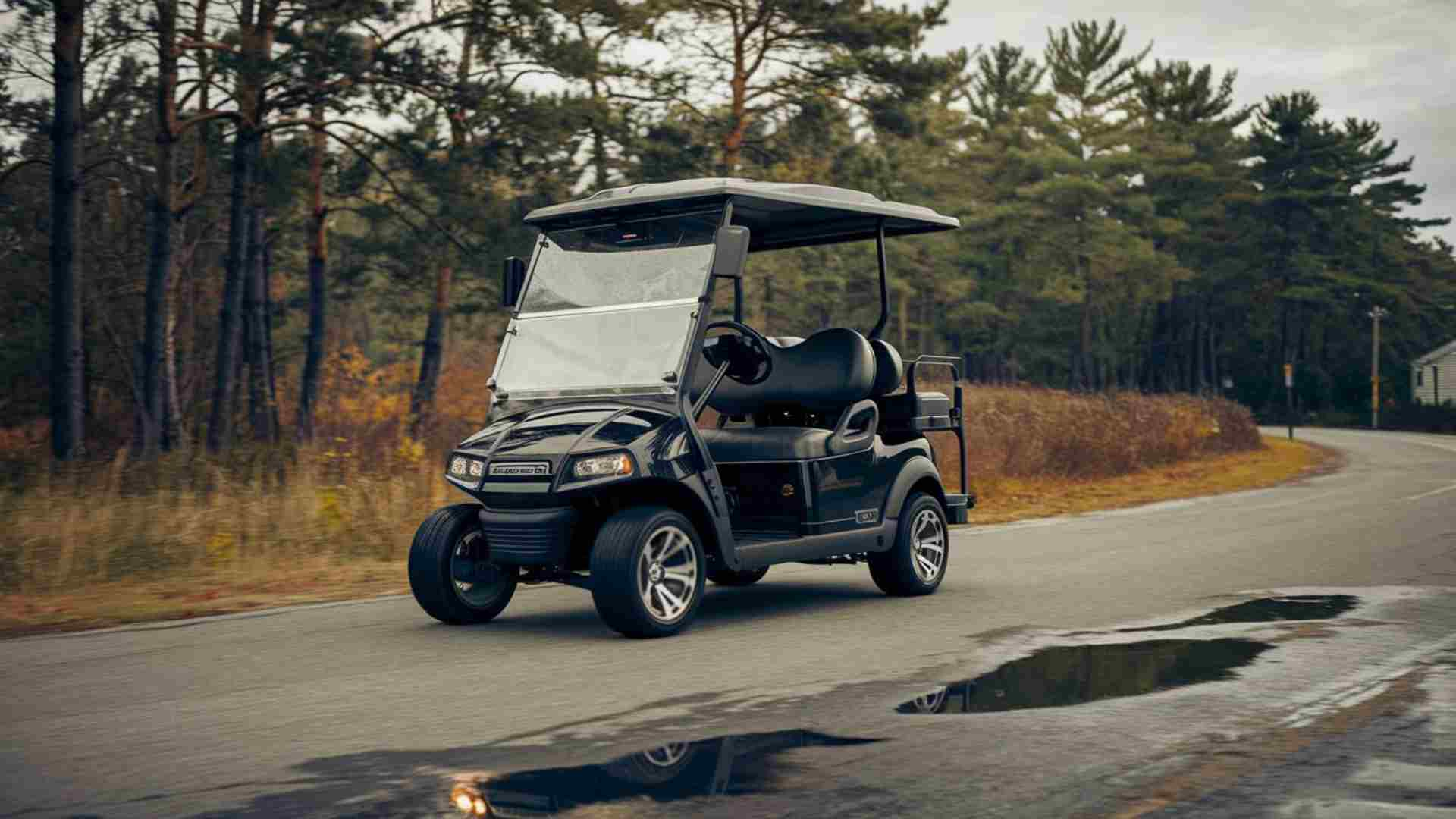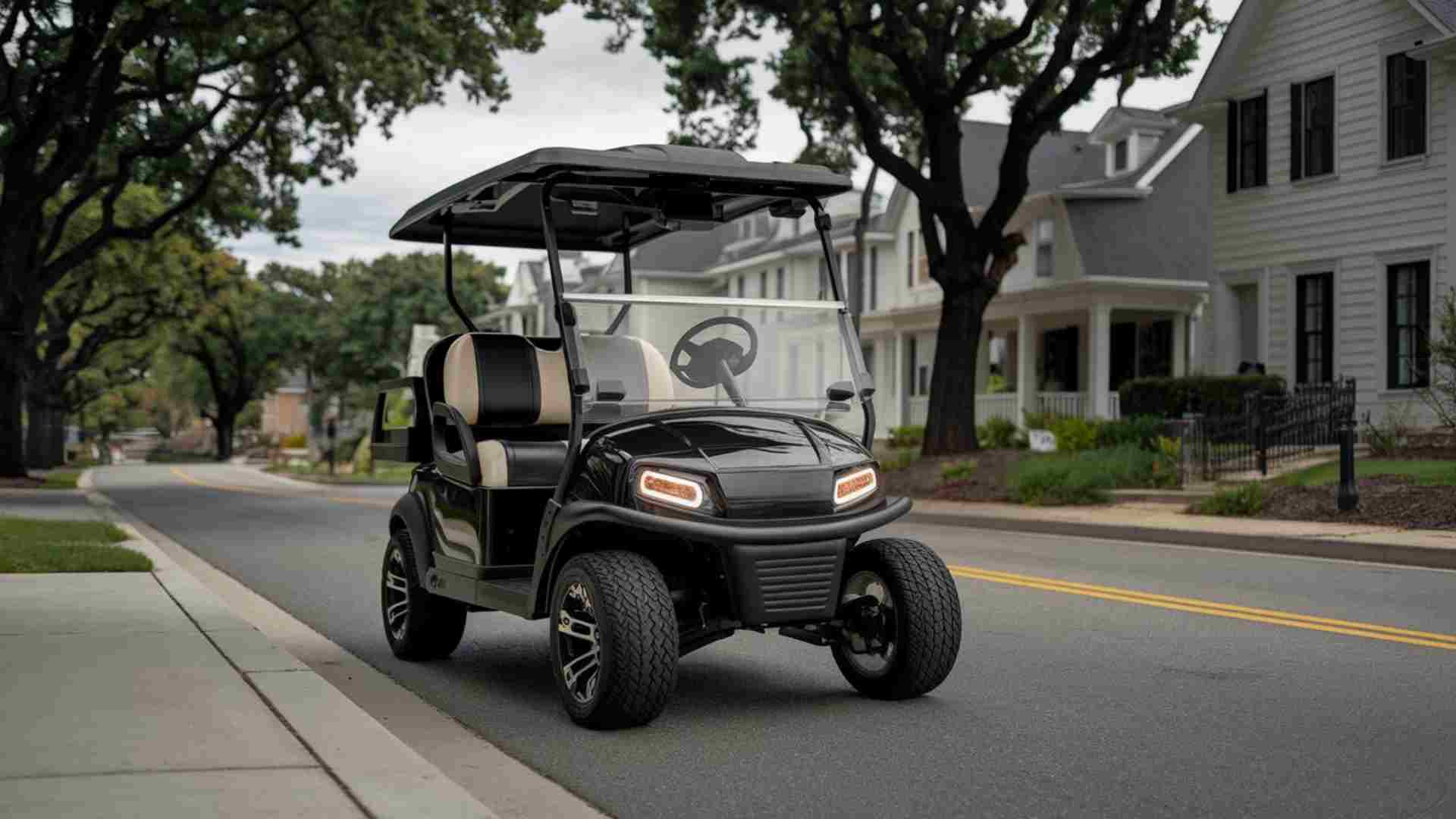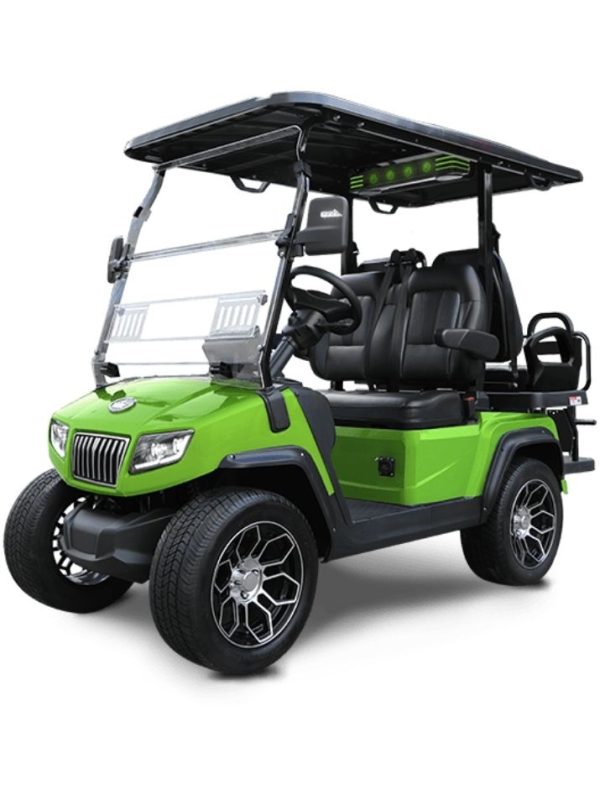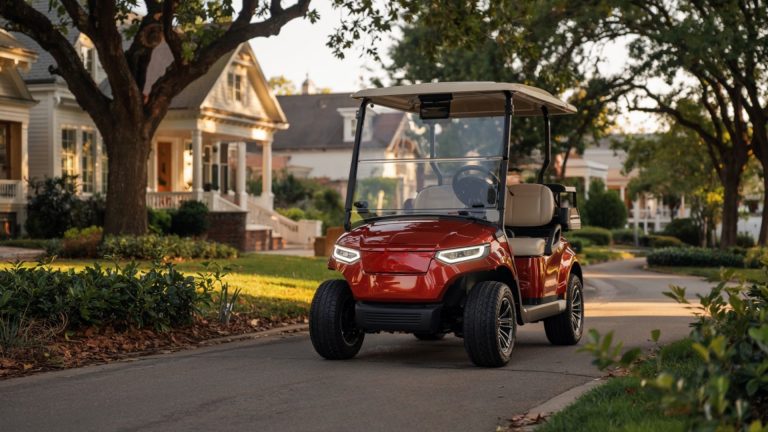
Conquering the Streets: Our Favorite New Jersey Street Legal Golf Carts
Street Legal Requirements
To ride our favorite New Jersey street legal golf carts on public roads, we need to understand the specific requirements set by the state. There are a few key steps and regulations we must follow.
Registration Process
In New Jersey, registering a golf cart is a crucial step to making it street legal. We do not need a permit or license to operate a golf cart, but it must be registered with the New Jersey Motor Vehicle Commission.
Here is a simple breakdown of the registration process:
- Gather Required Documents: We need the golf cart’s title, proof of insurance, and a completed registration application form.
- Visit NJ MVC: We must take these documents to a New Jersey Motor Vehicle Commission (MVC) office.
- Pay Fees: The registration fee varies, and we should be prepared to pay it at the time of registration.
| Step | Description |
|---|---|
| 1 | Gather Required Documents |
| 2 | Visit NJ MVC |
| 3 | Pay Fees |
For more detailed information, visit our page on street legal requirements in New Jersey and golf cart regulations.
Age Restrictions
New Jersey has specific age restrictions for operating golf carts. While we do not need a permit or license, there are age-related regulations we must observe:
- Under 18: Individuals under 18 are generally required to complete a safety education course. However, they are exempt if they only operate a golf cart at licensed special events or on public lands adjacent to farms (New Jersey Motor Vehicle Commission).
- Over 18: There are no specific age restrictions for those over 18, but adherence to all safety and registration requirements is mandatory.
For a closer look at these regulations, check out our guide on street legal golf carts and age restrictions in New Jersey.
By following these street legal requirements and understanding the registration process, we ensure our New Jersey street legal golf carts are compliant and ready for the streets.
Golf Cart Regulations in New Jersey
Navigating the world of New Jersey street legal golf carts can be a bit tricky, but we’ve got you covered with the essential regulations you need to know. Here are the key operating rules and safety education requirements.
Operating Rules
In New Jersey, you don’t need a permit or license to operate a golf cart. However, there are specific regulations that must be followed to ensure safe and legal operation. The golf cart must be registered, and you need to observe certain guidelines:
- Golf carts can only be operated on public lands designated for golf cart use.
- Riding on highways, streets, and sidewalks is generally prohibited.
- Operators must be at least 14 years old to drive on public lands.
- Operators under 18 must meet specific conditions for exemptions.
For a more detailed breakdown of the registration process, check out our section on street legal golf cart requirements and registration steps in New Jersey.
Safety Education
Safety education is crucial for operating a golf cart in New Jersey. While you don’t need a permit or license, there are safety education requirements to consider:
- Operators under 18 are required to complete a safety education course unless they are operating at licensed special events or on public lands adjacent to farms (New Jersey MVC).
- The safety course equips riders with the knowledge to handle their golf carts safely and responsibly.
It’s vital to familiarize yourself with these rules and education requirements to ensure you’re riding your golf cart legally and safely. For more on related topics, check out our articles on street legal golf carts in New Jersey and golf cart safety courses.
Making Your Golf Cart Street Legal
Navigating the requirements for making your golf cart street legal in New Jersey can seem daunting. However, with the right information, it becomes a manageable process. Here, we’ll guide you through the necessary steps, starting with out-of-state registration and then moving on to equipment requirements.
Out-of-State Registration
Due to New Jersey’s strict vehicle categories and motor vehicle inspection requirements, it’s not possible to register a golf cart as street legal within the state. Instead, we can register our golf cart in another state, which allows us to drive it on New Jersey roads, highways, and city streets. States like Montana and South Dakota offer golf cart registration as street legal vehicles.
To register your golf cart out of state, follow these steps:
- Choose a State: Montana and South Dakota are popular choices for registering golf carts as street legal.
- Gather Documentation: Ensure you have the necessary documents, including the bill of sale, title (if applicable), and proof of insurance.
- Complete Application: Fill out the registration application form for the chosen state.
- Submit Fees: Pay the required registration fees.
Once your golf cart is registered in another state, you can legally drive it in New Jersey under registration reciprocity agreements. Make sure to observe all New Jersey traffic laws and rules of the road, similar to cars. For more on the regulations, see our section on golf cart regulations in New Jersey.
Equipment Requirements
When it comes to equipment, street legal golf carts in New Jersey must comply with the requirements of the state where they are registered. This means that specific parts for New Jersey registration are not necessary. However, for safety and legality, the following equipment is typically required:
| Equipment | Description |
|---|---|
| Headlights | Functional for nighttime driving. |
| Taillights | Red taillights visible from the rear. |
| Turn Signals | Functional front and rear turn signals. |
| Horn | Audible from a reasonable distance. |
| Mirrors | At least one rearview mirror. |
| Windshield | Required unless wearing appropriate eye protection. |
| Brakes | Fully functional brakes. |
| Tires | Street-legal tires. |
These requirements ensure that your golf cart is safe and compliant for road use. For more information on making your golf cart street legal, check out our article on New Jersey street legal golf carts.
By following these guidelines, we can enjoy the freedom of driving our golf carts on New Jersey streets while ensuring we remain within the legal framework. Happy driving!
Reciprocity Agreements
Reciprocity agreements are key for those of us with street legal golf carts in New Jersey. These agreements allow us to drive our vehicles across state lines without having to re-register or modify them according to New Jersey’s specific requirements.
Interstate Driving
Interstate driving is made possible through these reciprocity agreements. If we have registered our golf carts in states like Montana or South Dakota, where golf carts can be registered as street legal vehicles, we can legally drive them on New Jersey roads with an out-of-state registration.
| State of Registration | Street Legal Requirement |
|---|---|
| Montana | Must comply with Montana vehicle code |
| South Dakota | Must comply with South Dakota vehicle code |
These states have specific regulations allowing golf carts to be registered for street use, and once registered, they can be driven legally in New Jersey.
Compliance with State Laws
Even though we benefit from these reciprocity agreements, we still need to comply with the traffic laws and rules of the road in New Jersey. This means respecting speed limits, observing traffic signals, and following the same regulations that apply to other street legal vehicles.
The good news is that street legal golf carts in New Jersey do not need to have specific parts required by New Jersey, as they only need to comply with the parts required by the state where they are registered. This makes it easier for us to enjoy our rides without worrying about additional modifications.
For more information on making your golf cart street legal, check out our guide on New Jersey street legal golf carts.
By understanding and leveraging these reciprocity agreements, we can navigate the streets of New Jersey with confidence and ease, knowing that our vehicles are compliant and ready for the road.
Off-Highway Vehicle Restrictions
When it comes to taking your street legal golf cart out on New Jersey roads, there are specific off-highway vehicle restrictions to be aware of. These regulations ensure safety and compliance with state laws.
Public Road Limitations
In New Jersey, off-highway vehicles not registered as street legal are restricted from driving on public roads. Exceptions include moving between loading/unloading points and the intended place of operation. Additionally, crossings are allowed on all roads except limited access highways, provided specific equipment requirements and age restrictions are met.
It is important to note that golf carts cannot be registered as street legal within New Jersey due to the state’s vehicle code, which categorizes these vehicles in a way that disqualifies them from being street legal. However, there is a workaround: golf carts can be made street legal by registering them in states like Montana and South Dakota, where the vehicle code allows for such registration. Once registered and equipped as required, these golf carts can be driven on New Jersey roads with an out-of-state registration.
Equipment Compliance
For an off-highway vehicle to be considered street legal in New Jersey, it must meet certain equipment standards. These requirements are generally determined by the state in which the vehicle is registered. For example, New Jersey does not impose specific parts requirements on street legal golf carts; instead, the vehicle must comply with the equipment standards of the state where it is registered.
The following table summarizes some common equipment requirements for making a golf cart street legal:
| Equipment | Requirement |
|---|---|
| Headlights | Required |
| Taillights | Required |
| Turn Signals | Required |
| Horn | Required |
| Mirrors | Required |
| Windshield | Optional (depending on state) |
These equipment standards ensure that the vehicle is safe to operate on public roads and complies with interstate reciprocity agreements. Vehicles licensed in other states can be driven legally in New Jersey under these agreements, provided they observe all local traffic laws and regulations similar to cars.
For more detailed information on making your golf cart street legal, visit our guide on New Jersey street legal golf carts. Additionally, if you’re interested in other street-legal vehicle options, check out our articles on street legal side-by-sides and street legal motorcycles in New Jersey.
GET THE GOLF CART LSV AT THE RIGHT PRICE!
Tigon Golf Carts proudly offers 0% Vehicle Financing, making it easier than ever to own your dream golf cart. With flexible payment options and competitive rates, we ensure that Upgrading or Purchasing for the first time is not only exciting but also financially feasible for our customers, allowing you to hit the road in style without breaking the bank.



















